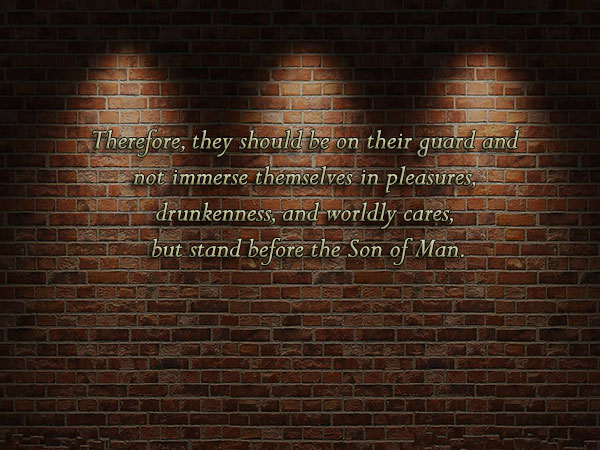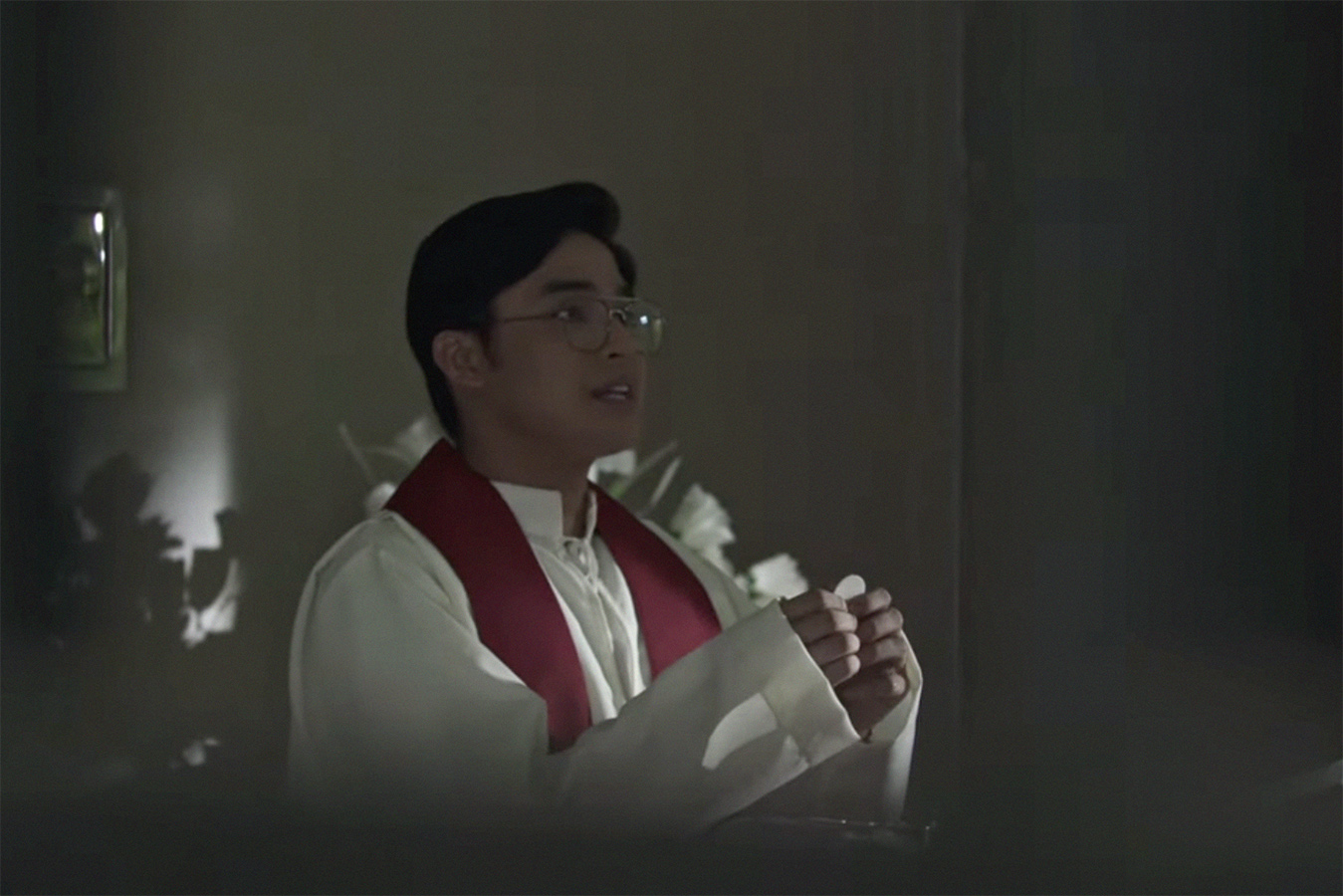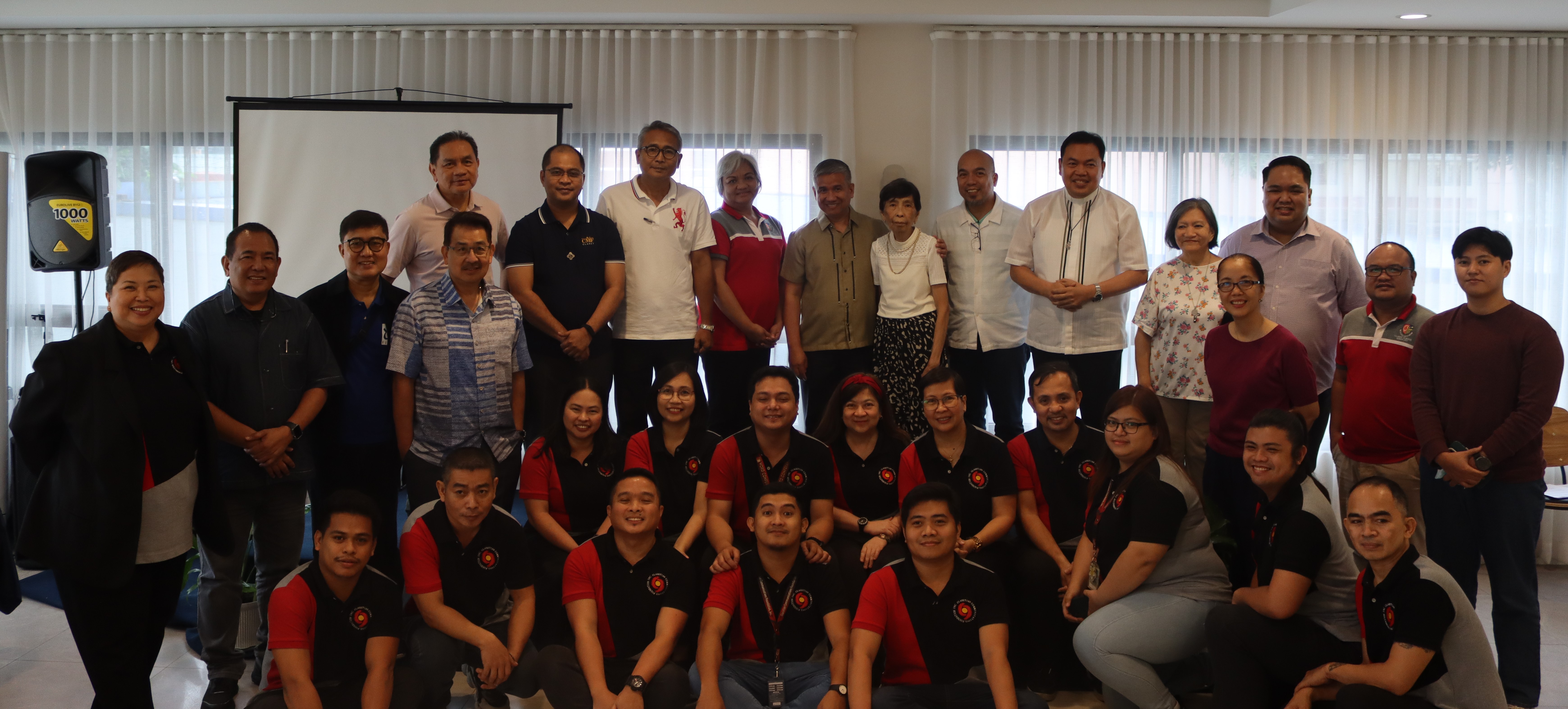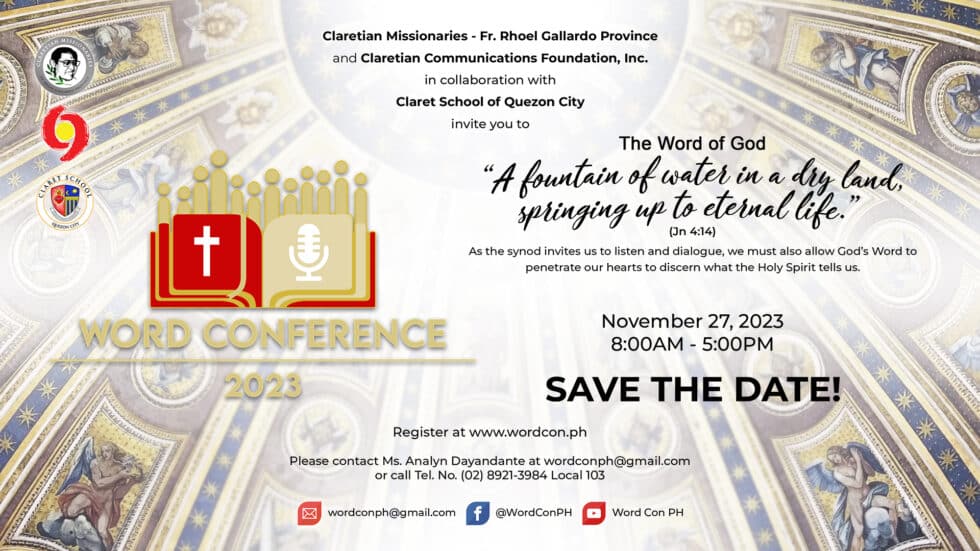The WORD OF GOD – The Heart of the Synodal Journey
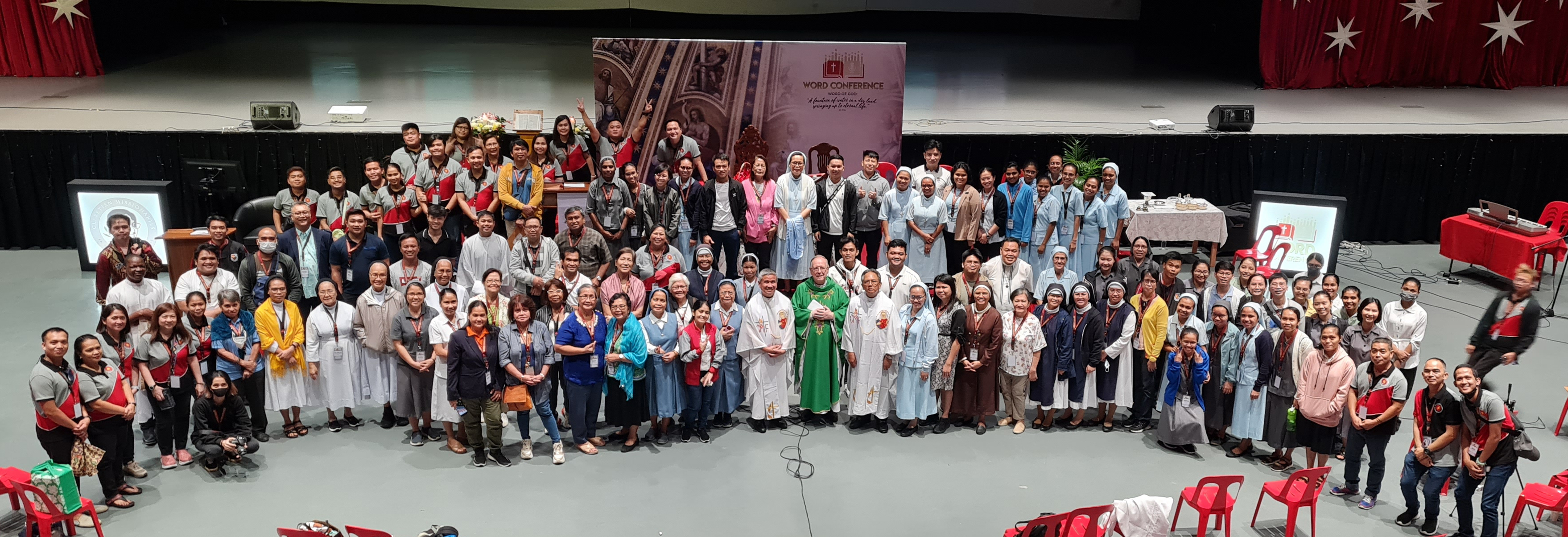
Word Conference (WordCon), a project of the Fr. Rhoel Gallardo Province of Claretian Missionaries in the Philippines, under the care of the Prefecture of Biblical Animation and Communications of the Claretian Missionaries and the Claretian Communications Foundation, Inc. (CCFI), in collaboration with Claret School of Quezon City (CSQC) was held on November 27, 2023, at the CSQC Auditorium, Quezon City, Philippines.
Now in its sixth year, the theme of the Word Conference 2023 is the WORD OF GOD: “A fountain of water in a dry land, springing up to eternal life.” (Jn 4:14). It hopes to start the dialogue and open more venues for conversation to understand further the importance of the recently concluded synod last October in the life of the faithful and the Church.

This year’s WordCon was a hybrid event attended by 232 participants: 156 onsite and another 76 joining online via Zoom. This hybrid setup was requested by those unable to participate onsite. Online participants came from as far as Papua New Guinea, Vietnam, the United Kingdom, and Bangladesh. Just like the onsite participants, they were able to interact with the Speakers during the Sala (Open Forum).
The conference started with a creative Bible Enthronement led by the CCFI employees. It was followed by the warm welcome of Fr. Elias L. Ayuban, Jr., CMF, Provincial Superior of the Fr. Rhoel Gallardo Province.
Fr. Henry Omonisaye, CMF, General Consultor and Prefect of Biblical Ministry and Communications of the Claretian Missionaries, also joined the conference online from Kenya and gave a very inspiring message to the organizers and participants of this year’s Word Conference.

As highlighted, the WORD OF GOD is the heart of this synodal process, the foundation of the Church’s mission. By proclaiming God’s Word in this synod, we are constantly reminded of the vital role it plays in the pastoral life of the Church and the understanding of our faith as we continuously seek God’s will in our lives.
The first talk, “Engaging the Synodal Path: Create in Me a Clean Heart, O God, and Renew a Steadfast Spirit Within Me.” (Ps 51:10-12), was presented by Fr. Rex F. Fortes, CM, who has a Licentiate in Sacred Scriptures (SSL) at the Pontifical Biblical Institute (Biblicum) in Rome and Hebrew University in Jerusalem and currently works as a Faculty Member and an Administrator of the St. Vincent School of Theology in Tandang Sora, Quezon City.

In his presentation, Fr. Rex stressed that to follow the leading of the Spirit in the synodal process, we needed two vital things: communal renewal and epistemological humility. He said, “The former entails much prayer, discernment, and commitment to transform as a Church. St. Vincent de Paul once said, “Give me a man of prayer, and he will be capable of everything,” suggesting that prayer is the dynamo that keeps the engine of “walking together” moving. The latter indicates an important step in a synodal encounter of leaving one’s ego and set of prejudices at the threshold of any conversation hall because it is only in humility that one encounters a friend or a brother/sister willing to listen, learn and speak authentically for the good of everyone.
He further mentioned that when these two elements are absent, we advance our interests, forget the people around us, and think less of the community. However, the opposite happens once we are rooted in these virtues. Hence, to be successful, we must imbibe the values of renewal and humility that we learned from Psalm 51:10(12). Otherwise, the Spirit we communally strive hard to follow may be lost in the noise of the capitalistic world and the darkness of spiritual decadence.

Fr. Eugene Dominic I. Hechanova, a priest for the Archdiocese of Lipa, Batangas, who is currently the Rector of St. Francis De Sales Minor Seminary, the Episcopal Vicar for Catholic Education, the Ministry Head of the Ministry on Faith Formation, and a member of the Lipa Archdiocesan Tribunal shared his reactions to the presentation.
He said the Synodal Path is not simply a path but a relationship. It speaks of people journeying together. He affirmed the speaker’s presentation that preliminary humility and renewal are mandatory in the synodal process. It allows us to go back to who we indeed are. Through humility and renewal, we cry aloud to God and let ourselves be found by God.
The second speaker, Fr. Edilberto B. Cepe, CSsR, who is presently the Provincial Superior of the Redemptorist Province of Cebu in the Philippines, focused his presentation on “The Road to Emmaus (Luke 24: 17): Walking Together on the Road, The Way of Synodality.”
Fr. Bert said that the Emmaus Story shows us that “we have a God who comes and involves himself in the journey of his people. He meets with his people, inquires about their concerns and problems, engages with them in conversation and dialogue, and helps them see the bigger picture, analyze the situation, and find solutions. There is a meeting, a dialogue, and reflection.”

Moreover, this journey involved dialogue: listening as the other shared his experiences, concerns, and feelings. Questions were brought out to clarify things more clearly. Part of the dialogue is to allow the word of God to enlighten the sharing, to see the bigger picture, and to see things from God’s perspective.
Fr. Bert concluded his presentation by posing a challenge on how synodality can be strengthened at the local level. While Basic Ecclesial Communities (BECs) are a reality in many parts of the Philippines, he emphasized the need to grow to be a church in communion participating in the three-fold mission of Christ. We need to surface the issues and concerns we face as a people, including the active participation and greater involvement of the majority of the members of the Church, the laity.
Dr. Agnes M. Brazal, a founding member of the DaKaTeo (Catholic Theological Society of the Philippines) and the first coordinator of the Ecclesia of Women in Asia (association of Catholic women theologians in Asia) emphasized that the virtue of humility in listening is needed in the synodal process.

She underscored proposals made by the Synod synthesis report in relation to women, such as 1) Integration of women “into seminary teaching and training programs to foster better formation for ordained ministry.” 2) Ensuring “that liturgical texts and Church documents are more attentive to the use of language that takes into equal consideration both men and women (referring to the use of gender-inclusive language), and also includes a range of words, images, and narratives that draw more widely on women’s experience.” 3) “That women receive appropriate formation to enable them to be judges in all canonical processes.”
Sr. Maria Anicia Co, RVM, who was a former President of the Catholic Biblical Association of the Philippines (CBAP) and has served as a General Consultor of the Congregation of the Religious of the Virgin Mary, presented her talk on “The Synodal Church and the Gospels.” She explained why Scripture is at the heart of the Synodal journey.
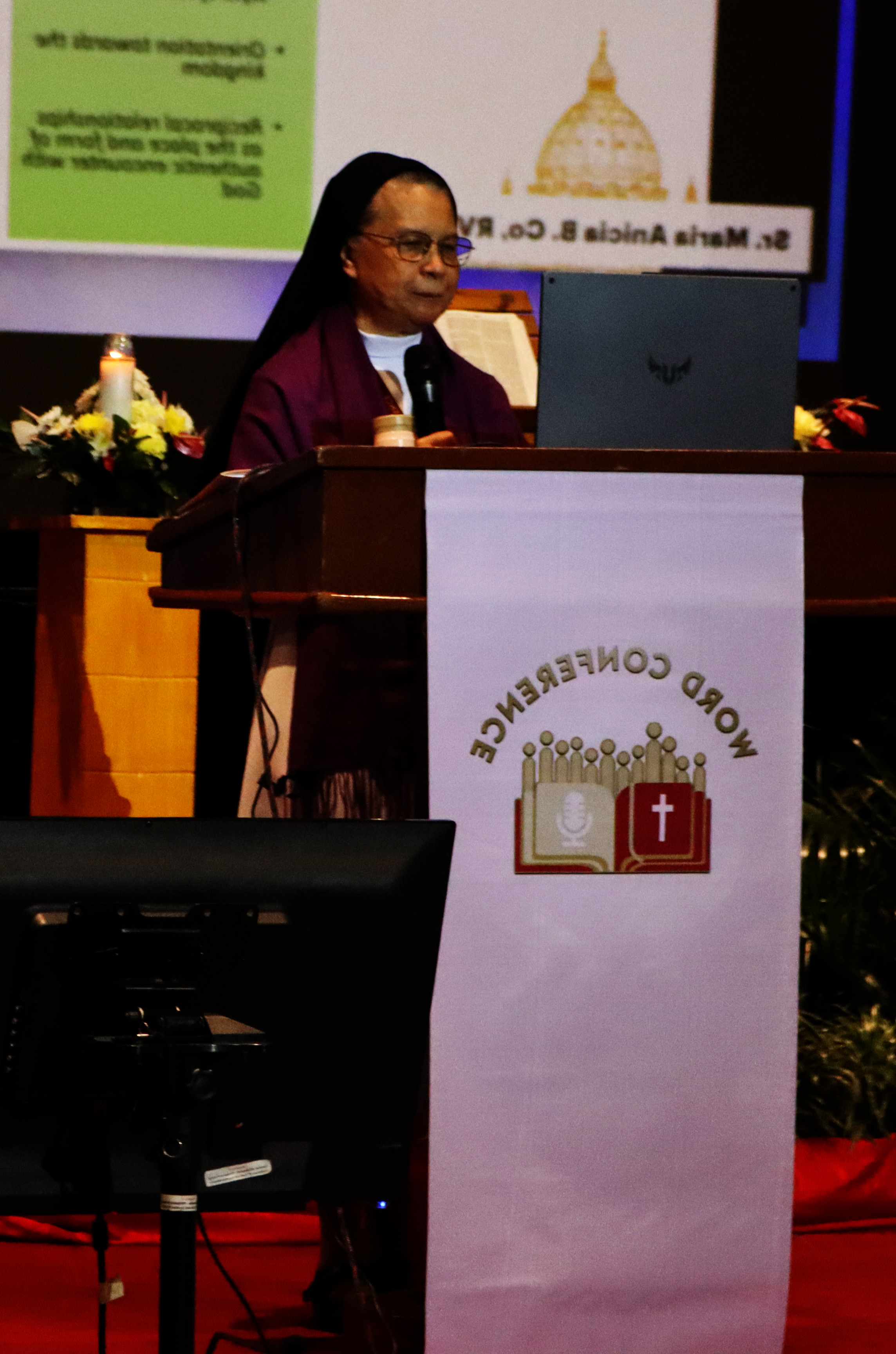
Sr. Annie suggested that a walk through the gospels is essential to understand synodality better. We start our walk through the gospels from and in Jesus Christ. Then, she suggested that we need to pay attention to five signposts: 1) Jesus is on the move, 2) Jesus is in touch with the Father’s will, 3) Jesus awakens people’s hearts and forms his disciples into a community of faith and love, 4) Jesus engages the disciples to go forth in mission, and 5) Jesus prepares the disciples for the rough road ahead.
Through these signposts, participants are challenged to see and affirm that Jesus himself is the root of the synodality of the Church. She explained that the disciples’ experience with Jesus, as shown in the gospels, reflects their formation into the attitudes, values, and lifestyle of Jesus, who leads them, forms them, and accompanies them to become a synodal community of the Risen Lord.
Sr. Annie concluded her presentation by inviting the participants to have the trust, the courage, the patience and perseverance to continue in the synodal journey. She emphasized respecting one another, being open to differences, being unafraid of disagreement, and believing that the Holy Spirit will lead us to understand everything in God’s appropriate time.

Fr. Norlan H. Julia, SJ, rector of the San Jose Seminary (Ateneo de Manila University), a Catholic formation institution for diocesan seminarians run by the Society of Jesus in Quezon City, started his reflection by sharing his more than a decade experience as a formator and rector of major seminaries. He said that religious formators and the laity could also relate and apply these experiences to their communities.
He emphasized the need for priests, religious, and the laity to be formed in the likeness of Christ. To form them to be like Christ has implications in the formation process – through accompaniment, discernment, and pastoral charity.
The last speaker, Fr. José Cristo Rey García Paredes, CMF, a Claretian Missionary and a renowned theologian, Mariologist, and an expert in the Theology of Consecrated Life, presented his talk on “Mary, Mother of the Church (John 19: 25-34), Journeying with Us in the Synodal Path.”
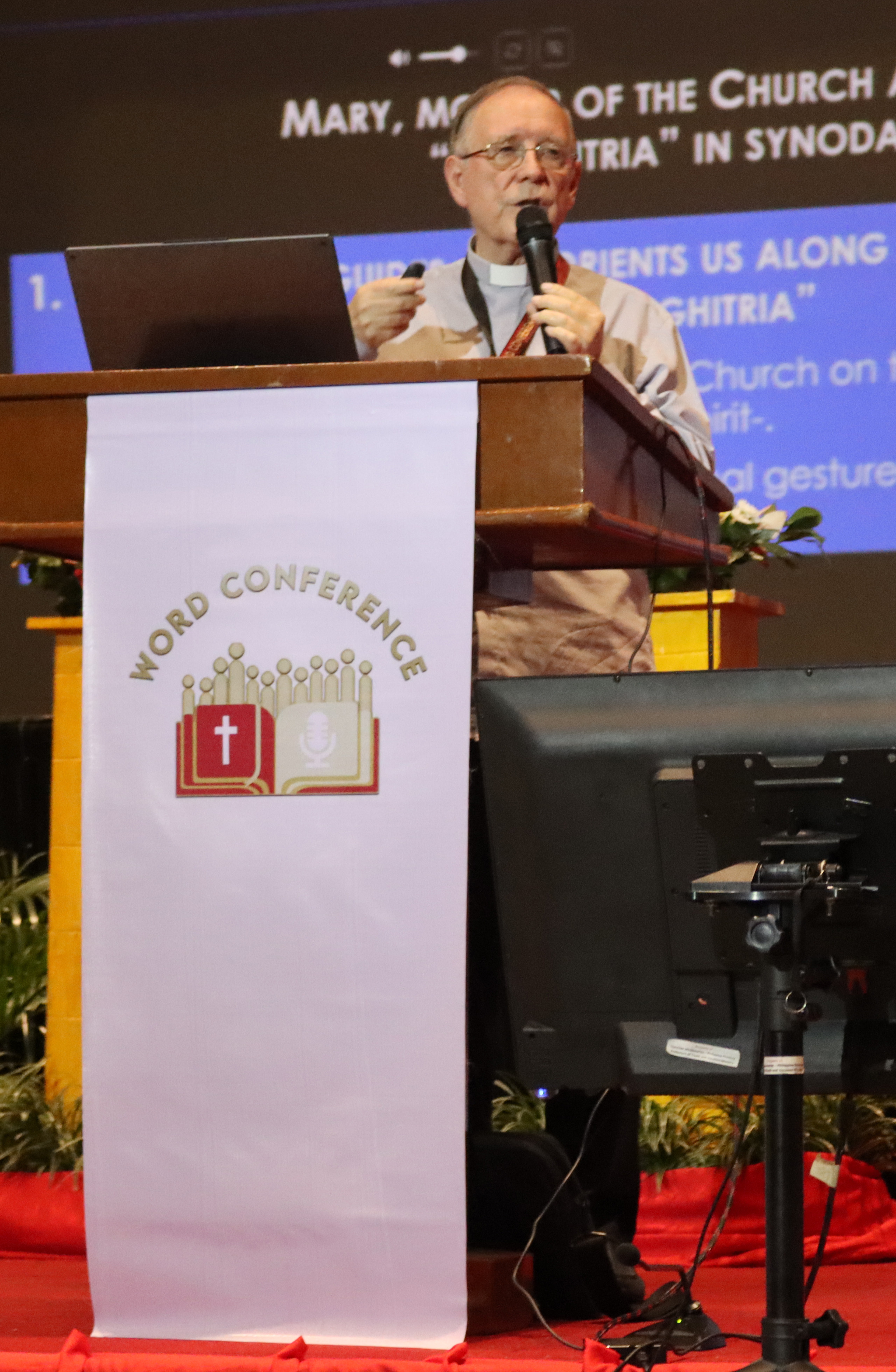
Fr. Cristo Rey divided his reflections into three parts: 1) Mary on the synodal journey: imagined or real presence, 2) Mary, accomplice of the Spirit in mission, 3) Mary, Mother of the Church and “Odighitria” in synodality.
To understand what place the Blessed Mother occupies in synodality, Fr. Cristo Rey mentioned that the key to the answer can be found in a theological treatise that had been somewhat forgotten until recently: the treatise on the Holy Spirit or Pneumatology. Pope Francis said “that the Holy Spirit is the Protagonist of the Synod. Without the Spirit, there will be no Synod…”
He also mentioned Mary as the Spirit’s main and best partner. The Spirit acts through his accomplices: the prophets, apostles, artists, and saints, but, above all, through Mary, a “partner,” an “associate,” and “ambassador.” In the life of the Church, Mary becomes present and acts thanks to the Spirit. Indeed, we can say Mary is the “first accomplice of the Spirit” in mission.
To conclude his presentation, Fr. Cristo Rey said that from her Immaculate Conception to her glorious Assumption, Mary is a symbol, presence, and Odighitria of the whole life of the Church and our spiritual life. The Church’s history begins in the Virgin Mary’s womb and will culminate in Mary’s glorified body.
Fr. Samuel H. Canilang, CMF, a Claretian Missionary who runs the HOGAR (Hermitage and Organic Gardens) in Tanay, Rizal, an arm of the Institute for Consecrated Life in Asia (ICLA) in promoting Ecological Spirituality, affirmed the role of Mary in this synod.

Fr. Sammy refocused his sharing in view of what he considers to be the Marian pastoral accompaniment of the main insights of the presentation. He reordered Fr. Cristo Rey’s insights according to experiential, theological, and pastoral categories.
In conclusion, Fr. Sammy ended his sharing with a question to Fr. Cristo Rey about his thoughts in the light of Mariology and Synodality on women’s desire for full and co-equal participation in the Church’s mission and sacramental, ministerial and institutional life.
After the presentations, a concelebrated Eucharistic celebration followed with Fr. Cristo Rey Garcia Paredes, CMF, as the main presider. (photo of the priests at the altar)

Mr. Alvin Macaranas, from the Kapatirang Claretiano, Inc., and Miss Ma. Rosario Garcia, FEC, delegate coordinator of Fraternidade Ecclesial Claretiana, moderated the Q & A during the Sala. Fr. Julius Jose A. Coching, CMF, Parish Priest of the Immaculate Heart of Mary Parish, hosted the event.

The Roman Catholic Diocese of Cubao and the Catholic Bishops’ Conference of the Philippines-Episcopal Commission on Biblical Apostolate endorsed the WordCon 2023, while LiCAS.news, Veritas 846, The Philippine Daily Inquirer, TV Maria, and the Archdiocese of Manila – Office of Communications served as the event’s Media Partners.



